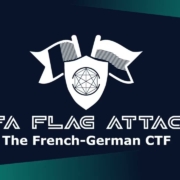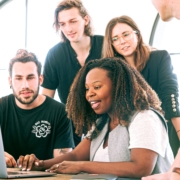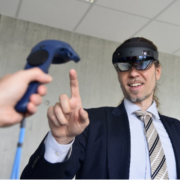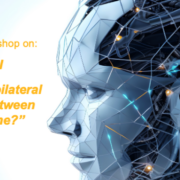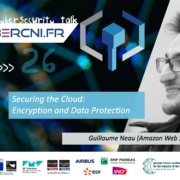In May we published our 3rd CfP “Education and Knowledge”. With the emergence of advanced technologies and increased automation, it has become imperative for higher education institutions to incorporate up-to-date learning formats to meet the skill-set demands of current industrial needs. New and existing formats for intensive tuition enable students to stay abreast of cutting-edge technologies and develop competencies needed for careers in the Industry of the Future.
Our call was addressed to researchers from TUM and IMT or to researchers that wanted to team up with researchers of these institutions. As it is one of our core missions to foster the French-German relations, it was also obligatory that the projects take place on a French-German scale or even an international scale.
This year we received again high quality proposals from brilliant researchers. These projects will be supported from us over the next year:
Summer School “ai4industry”, July 24-28, 2023,
online and on-site at Mines Saint Etienne (France) and Universidade de São Paulo (Brazil) (3rd edition)
The summer school aims to teach the state of the art of the use of AI technologies and models to tackle the challenges of data revolution and to increase automation of cognitive tasks to develop a trustful and resilient Industry 4.0 (or Industry of the Future). The summer school is organized around concrete industry problems structured as use cases. These use cases aim to stimulate the discussion at the academic institutions toward addressing real-world problems and to showcase innovative solutions to industrial partners. More info here: https://ai4industry2023.sciencesconf.org/
Workshop “5G Advanced for the Industry of the Future”,
September 21-22 at EURECOM in Sophia Antipolis (France)
We are delighted to invite you to attend the 2023 international workshop “5G-Advanced for the Industry of the Future”, where you will learn about the latest innovations in mobile networking, and their benefits for different use cases in the context of some of the industry 4.0 leaders. You will also gain insight on what can be expected from the latest R&D national programs in France, Germany and beyond, offering a glimpse into future opportunities related to 6G. The workshop will be held at EURECOM at the heart of Sophia Antipolis, where the leading industry labs and academic research centers meet to build the Future. More info here: https://www.5gsophia.fr/
Hackathon “GreenHack~IT”, 4 days in spring 2024 (2nd edition)
GreenHack~IT endeavors to let final year French and German graduate students (LMD +5) well versed in machine learning and data analytics, unleash their creativity and skill, and challenge themselves through participation in a hackathon, by tackling a significant industrial problem in light of sustainable development objectives that will contribute to ushering the age of Industry 4.0. Relevance in terms of initial and vocational education and/or life-long learning – Although both TUM and IMT students receive high-quality education, nothing replaces hands-on experience on real-life problems, within a time-constrained setting, close to what they would face in their future jobs. This is precisely what GreenHack~IT will provide to students, an opportunity to be better prepared for their future careers but also a type of experience held in high esteem by companies. Website of the last edition in 2022: https://sites.google.com/view/greenhackit/
Capture the Flag Platform “CyberCTF”, launch end of 2024
Capture the Flag (CTF) challenges are probably best known from cybersecurity contexts. However, the concept can also be applied to other learning material, putting gamification elements and competition in the foreground for motivating learners to invest a lot of energy in learning.
Cybersecurity is a key competency for industry today. It is necessary for almost all branches since Information Technology (IT) and Operational Technology (OT) systems are ubiquitous. Providing more and better teaching in cybersecurity is therefore a central requirement on a global scale. This project focuses on the German-French context, giving learners in our tandem area an advantage that can help increasing productivity in both countries.
The motivation behind this project is to leverage the educational benefits of Capture The Flag (CTF) competitions as a powerful tool for teaching practical skills including hacking skills in the cybersecurity context. CTF competitions are popular in the cybersecurity community and are often organized as part of cybersecurity workshops, conferences, and industry events. By presenting students with a series of purposely designed systems with security vulnerabilities, CTF challenges allow them to practice exploiting these vulnerabilities and obtain flags as proof of successfully mastering each challenge. Through this game-based learning approach, students accumulate points based on the number of flags obtained, fostering a competitive environment.
The project aims to build a CTF platform and use it to enhance students’ understanding of cybersecurity principles and techniques. It also aims to provide them with invaluable hands- on experience in a controlled and simulated environment. By addressing real-world scenarios and domains, such as IoT and automotive systems, this project intends to allow students to gain practical skills to excel in cybersecurity and make them more prepared for future careers in the industry. In traditional classroom settings, such practical skills cannot be gained.
Winter School for the Multiphase Erasmus Mundus Master’s Program
(program starting in 2024, first winter school early 2025)
The MULTIPHASE project proposes an Erasmus Mundus master’s joint program in the booming field of Multiphase Systems, with the ambition of educating a new generation of industrial experts, engineers, and researchers, to bring the Chemical Industry into a new age based on sustainable processes, circular economy and all the potential of digital tools.
This Erasmus Mundus MSc. Program will give the opportunity to learn state-of-the-art knowledge and methods to understand, manipulate and design innovative industrial processes involving particles, drops and bubbles. These systems are ubiquitous in nature and industry: energy, environment, chemical, health, additive manufacturing, …
The GFA is a sponsor for the annual winter school of the master’s program.
More info here: https://www.multiphase-master.eu/

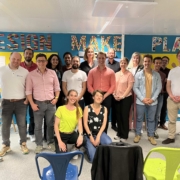
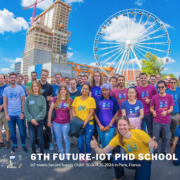
 iStock Photos
iStock Photos
